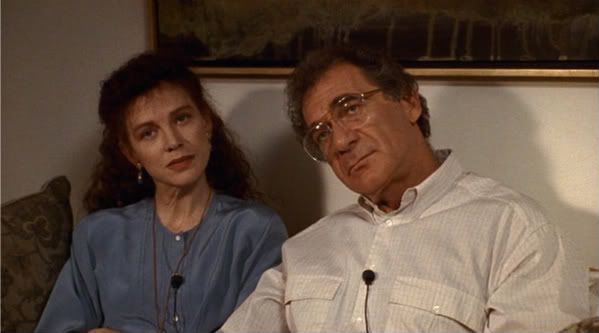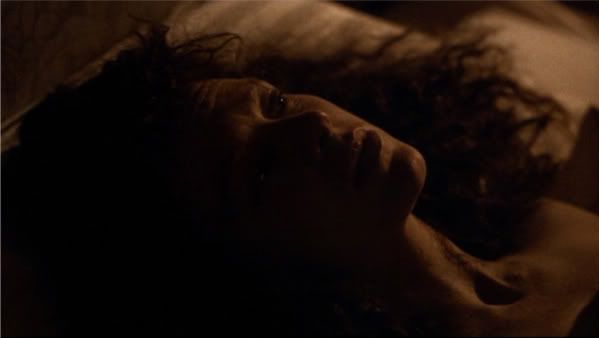 FILM
FILM In Which This Is One Of The Most Subtle Methods For Showing Concern
 Thursday, July 2, 2009 at 4:15PM
Thursday, July 2, 2009 at 4:15PM 
Hassidic Tales, with A Guide to Their Interpretation by the Noted Scholar
by WOODY ALLEN
A man journeyed to Chelm in order to seek the advice of Rabbi Ben Kaddish, the holiest of all ninth-century rabbis and perhaps the greatest noodge of the medieval era. "Rabbi," the man asked, "where can I find peace?" The Hassid surveyed him and said, "Quick, look behind you!" The man turned around, and Rabbi Ben Kaddish smashed him in the back of the head with a candlestick. "Is that peaceful enough for you?" he chuckled, adjusting his yarmulke.
In this tale, a meaningless question is asked. Not only is the question meaningless but so is the man who journeys to Chelm to ask it. Not that he was so far away from Chelm to begin with, but why shouldn't he stay where he is? Why is he bothering Rabbi Ben Kaddish—the Rabbi doesn't have enough trouble? The truth is, the Rabbi's in over his head with gamblers, and he has also been named in a paternity case by a Mrs. Hecht. No, the point of this tale is that this man has nothing better to do with his time than journey around and get on people's nerves. For this, the Rabbi bashes his head in, which, according to the Torah, is one of the most subtle methods of showing concern. In a similar version of this tale, the Rabbi leaps on top of the man in a frenzy and carves the story of Ruth on his nose with a stylus.

Rabbi Raditz of Poland was a very short rabbi with a long beard, who was said to have inspired many pogroms with his sense of humor. One of his disciples asked, "Who did God like better—Moses or Abraham?"
"Abraham," the Zaddik said.
"But Moses led the Israelites to the Promised Land," said the disciple.
"All right, so Moses," the Zaddik answered.
"I understand, Rabbi. It was a stupid question."
"Not only that, but you're stupid, your wife's a meeskeit, and if you don't get off my foot you're excommunicated."
Here the Rabbi is asked to make a value judgment between Moses and Abraham. This is not an easy matter, particularly for a man who has never read the Bible and has been faking it. And what is meant by the hopelessly relative term "better"? What is "better" to the Rabbi is not necessarily "better" to his disciple. For instance, the Rabbi likes to sleep on his stomach. The disciple also likes to sleep on the Rabbi's stomach. The problem here is obvious. It should also be noted that to step on a rabbi's foot (as the disciple does in the tale) is a sin, according to the Torah, comparable to the fondling of matzos with any intent other than eating them.

A man who could not marry off his ugly daughter visited Rabbi Shimmel of Cracow. "My heart is heavy," he told the Rev, "because God has given me an ugly daughter."
"How ugly?" the Seer asked.
"If she were lying on a plate with a herring, you wouldn't be able to tell the difference."
The Seer of Cracow thought for a long time and finally asked, "What kind of herring?" The man, taken aback by the query, thought quickly and said, "Er—Bismarck."
"Too bad," the Rabbi said. "If it was Maatjes, she'd have a better chance."

Here is a tale that illustrates the tragedy of transient qualities such as beauty. Does the girl actually resemble a herring? Why not? Have you seen some of the things walking around these days, particularly at resort areas? And even if she does, are not all creatures beautiful in God's eyes? Perhaps, but if a girl looks more at home in a jar of wine sauce than in an evening gown she's got big problems. Oddly enough, Rabbi Shimmers own wife was said to resemble a squid, but this was only in the face, and she more than made up for it by her hacking cough— the point of which escapes me.
Rabbi Zwi Chaim Yisroel, an Orthodox scholar of the Torah and a man who developed whining to an art unheard of in the West, was unanimously hailed as the wisest man of the Renaissance by his fellow-Hebrews, who totalled a sixteenth of one per cent of the population. Once, while he was on his way to synagogue to celebrate the sacred Jewish holiday commemorating God's reneging on every promise, a woman stopped him and asked the following question: "Rabbi, why are we not allowed to eat pork?"
"We're not?" the Rev said incredulously. "Uh-oh."
This is one of the few stories in all Hassidic literature that deals with Hebrew law. The Rabbi knows he shouldn't eat pork; he doesn't care, though, because he likes pork. Not only does he like pork; he gets a kick out of rolling Easter eggs. In short, he cares very little about traditional Orthodoxy and regards God's covenant with Abraham as "just so much chin music." Why pork was proscribed by Hebraic law is still unclear, and some scholars believe that the Torah merely suggested not eating pork at certain restaurants.

Rabbi Baumel, the scholar of Vitebsk, decided to embark on a fast to protest the unfair law prohibiting Russian Jews from wearing loafers outside the ghetto. For sixteen weeks, the holy man lay on a crude pallet, staring at the ceiling and refusing nourishment of any kind. His pupils feared for his life, and then one day a woman came to his bedside and, leaning down to the learned scholar, asked, "Rabbi, what color hair did Esther have?" The Rev turned weakly on his side and faced her. "Look what she picks to ask me!" he said. "You know what kind of a headache I got from sixteen weeks without a bite!" With that, the Rabbi's disciples escorted her personally into the sukkah, where she ate bounteously from the horn of plenty until she got the tab.
This is a subtle treatment of the problem of pride and vanity, and seems to imply that fasting is a big mistake. Particularly on an empty stomach. Man does not bring on his own unhappiness, and suffering is really God's will, although why He gets such a kick out of it is beyond me. Certain Orthodox tribes believe suffering is the only way to redeem oneself, and scholars write of a cult called the Essenes, who deliberately went around bumping into walls. God, according to the later books of Moses, is benevolent, although there are still a great many subjects he'd rather not go into.

Rabbi Yekel of Zans, who had the best diction in the world until a Gentile stole his resonant underwear, dreamed three nights running that if he would only journey to Vorki he would find a great treasure there. Bidding his wife and children goodbye, he set out on a trip, saying he would return in ten days. Two years later, he was found wandering the Urals and emotionally involved with a panda. Cold and starving, the Rev was taken back to his home, where he was revived with steaming soup and flanken. Following that, he was given something to eat. After dinner, he told this story: Three days out of Zans, he was set upon by wild nomads. When they learned he was a Jew, they forced him to alter all their sports jackets and take in their trousers.

As if this were not humiliation enough, they put sour cream in his ears and sealed them with wax. Finally, the Rabbi escaped and headed for the nearest town, winding up in the Urals instead, because he was ashamed to ask directions.
After telling the story, the Rabbi rose and went into his bedroom to sleep, and, behold, under his pillow was the treasure that he originally sought. Ecstatic, he got down and thanked God. Three days later, he was back wandering in the Urals again, this time in a rabbit suit.
The above small masterpiece amply illustrates the absurdity of mysticism. The Rabbi dreams three straight nights. The Five Books of Moses subtracted from the Ten Commandments leaves five. Minus the brothers Jacob and Esau leaves three. It was reasoning like this that led Rabbi Yitzhok Ben Levi, the great Jewish mystic, to hit the double at Aqueduct fifty-two days running and still wind up on relief.
Woody Allen is the focus of Woody Allen Week. This is an excerpt from the complete collection of Woody's prose, you can purchase here.

"Last of the Hobo Kings" - Mary Gauthier (mp3)
"Same Road" - Mary Gauthier (mp3)
"I Ain't Leaving" - Mary Gauthier (mp3)













































